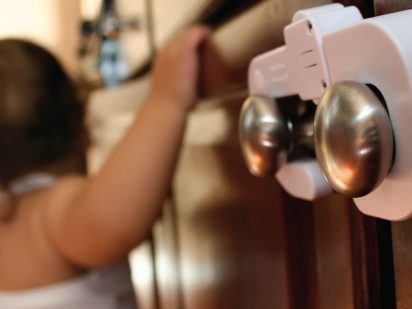Let’s face it. Sometimes, kids get into things that they probably shouldn’t.
Everyday household items, such as cleaning products, personal care products, and unsecured medications, can be harmful to kids. “Poisoning is the third
leading cause of unintentional injury death among children ages one to 19 years,” said Amber Emerson, RN, Trinity Health Trauma Services and coordinator of Safe Kids Minot.
According to the Centers for Disease Control and Prevention, over 300 children – those age 19 years and under – in the United States are treated in an emergency department and two children die because of being poisoned. “It’s not just chemicals in your home marked with clear warning labels that can be dangerous to children,” the CDC warned on their website.
One such danger is liquid nicotine, Emerson noted. Disposable and prefilled cartridge e-cigarettes are the least dangerous because the liquid nicotine ordinarily can’t leak out unless the cartridge is somehow broken, Emerson explained. However, the refillable devices need to be refilled from larger containers, which are not fitted with child-resistant caps. The liquid nicotine easily flows out and can be swallowed or spilled onto the child’s skin or clothing.
“The nicotine is so concentrated that even a small amount can be toxic,” Emerson said. Symptoms occur within minutes and include a stinging bitter taste, drooling, gagging, vomiting, and dizziness. “In severe cases, seizures and a fatal drop in blood pressure can occur,” Emerson said, noting that the child should be brought to their medical provider and the poison control hotline notified immediately.
The CDC recommends the following poison prevention tips:
- Lock them up and away. Medicines and toxic products, such as cleaning solutions and detergent pods, should be kept in their original packaging and in a spot where children can’t see or get them. “Remember that bright labels are attractive to children and that child-resistant does not mean childproof,” Emerson added.
- Know the number. Put the nationwide poison control center phone number (1-800-222-1222) on or near every telephone in your home and program it into your cell phone. “You never know when you may need it,” Emerson said. “When in doubt, call poison control.”
- Read the label. Follow the label directions carefully and read all warnings when giving medicines to children.
- Don’t keep it if you don’t need it. This includes unused, unneeded, or expired prescription drugs and over-the-counter drugs, vitamins, and supplements. Medicines can be mixed with coffee grounds or kitty litter and thrown away or they can be turned in at a local take-back program.

